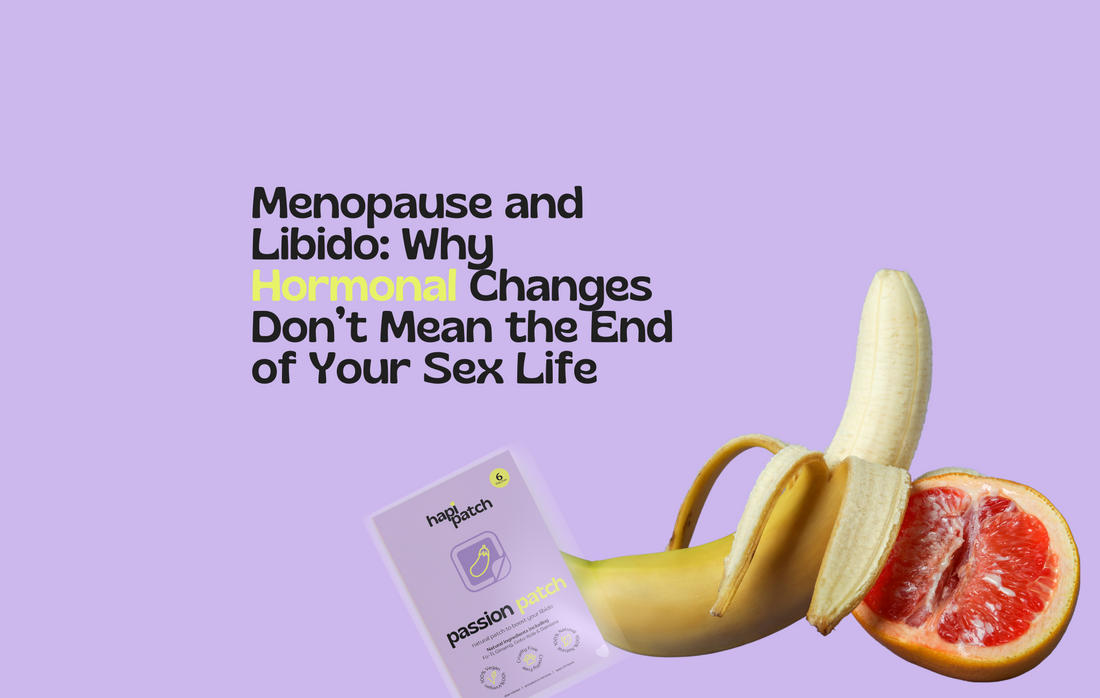Menopause is often seen as a daunting time in a woman’s life, marked by hot flashes, night sweats, mood swings, and for many, a noticeable decline in libido. While it’s true that the hormonal shifts during menopause can affect sexual desire, this doesn’t mean the end of your sex life. In fact, with the right approach, you can maintain a satisfying and active sex life during and after menopause.
In this blog, we will explore how menopause impacts libido, the science behind these hormonal changes, and natural ways to boost sexual desire. We will also discuss how The Passion Patch, a transdermal libido patch, can provide support for women seeking to revitalise their sexual health naturally.
Hormonal Changes During Menopause: The Science Behind It
Menopause typically occurs between the ages of 45 and 55, marking the end of a woman’s reproductive years. During menopause, the ovaries stop releasing eggs, and the production of hormones like oestrogen, progesterone, and testosterone declines. These hormonal changes are responsible for many of the common symptoms associated with menopause, including hot flashes, weight gain, sleep disturbances, and mood swings. But one of the less discussed—yet equally important—effects is on sexual desire.
- Oestrogen: Oestrogen is vital for maintaining vaginal health, including lubrication and elasticity. When oestrogen levels drop, vaginal dryness can occur, leading to discomfort or pain during sex, which naturally decreases libido.
- Testosterone: Though testosterone is often associated with men, it plays a crucial role in women’s sexual desire as well. As testosterone levels decline during menopause, many women experience a decrease in libido, less energy, and even reduced sexual satisfaction.
The combination of these hormonal changes can result in a lowered sex drive, leading many women to feel like they’ve lost an essential part of themselves. This experience can leave women feeling frustrated and disconnected from their bodies.
Emotional and Psychological Factors
It’s not just physical changes that impact libido during menopause. Psychological factors, such as anxiety, depression, and body image issues, often exacerbate sexual difficulties. As menopause affects physical appearance (e.g., weight gain or changes in skin texture), many women feel less confident and less desirable, which can further reduce interest in sex.
Moreover, disrupted sleep from night sweats or insomnia can leave women feeling fatigued and irritable, making sexual activity feel like an extra task rather than something enjoyable.
Why Hormonal Changes Don’t Mean the End of Your Sex Life
While menopause brings about significant changes, it doesn’t mean the end of sexual satisfaction. Many women find that with some adjustments, they can continue to enjoy a fulfilling sex life well into their later years. It’s important to understand that a drop in libido is not uncommon or a sign that something is "wrong" with you. It’s a normal part of the aging process, and there are ways to manage it.
Natural Ways to Improve Libido During Menopause
There are several natural strategies to help restore libido and improve sexual health during menopause:
- Exercise Regularly
Exercise is one of the best ways to support hormonal balance, improve mood, and boost energy. Regular physical activity promotes good circulation, which is essential for sexual function, and helps combat fatigue. Yoga, strength training, and cardiovascular exercise are especially beneficial.
- Maintain a Healthy Diet
A nutrient-rich diet can support hormone production and improve overall health. Include foods that are rich in omega-3 fatty acids (like salmon and flaxseeds), zinc (like pumpkin seeds and chickpeas), and magnesium (found in leafy greens) to promote hormonal balance and energy.
- Manage Stress
Stress is a significant factor that can negatively affect libido. High levels of cortisol, the body’s stress hormone, can suppress the production of sex hormones. Stress-relief techniques like mindfulness, meditation, and yoga can help manage cortisol levels and improve libido.
- Consider Libido-Boosting Patches
One effective way to address menopausal libido loss is by using a natural libido-boosting patch like The Passion Patch. This transdermal patch delivers natural aphrodisiac ingredients, such as ginseng and Tribulus Terrestris, directly into the bloodstream, providing consistent support for sexual desire.
How The Passion Patch Works
The Passion Patch uses transdermal technology to deliver a steady dose of natural libido-enhancing ingredients through the skin and into the bloodstream. This method bypasses the digestive system, ensuring that the active ingredients are absorbed efficiently and consistently throughout the day.
Key Ingredients in The Passion Patch:
- Ginseng Extract: Known for boosting energy and reducing fatigue, ginseng supports sexual health by improving stamina and reducing stress.
- Tribulus Terrestris: A well-researched herb known for its ability to naturally increase testosterone levels, which can help enhance libido in women.
- L-Arginine: An amino acid that supports healthy blood flow, improving circulation to the genital area and enhancing arousal.
- Damiana Extract: A natural aphrodisiac that helps improve mood and sexual function, making it easier to enjoy intimacy.
The Benefits of Transdermal Delivery
Transdermal patches like The Passion Patch are highly effective because they allow the active ingredients to bypass the digestive system. This ensures that the nutrients are absorbed directly into the bloodstream, where they can have the greatest impact. With its 4-layered matrix design, The Passion Patch provides a continuous release of ingredients over 24 hours, offering consistent support for libido without the need for multiple doses or pills.
FAQ: Menopause and Libido
- How does menopause affect libido?
During menopause, the decline in oestrogen, progesterone, and testosterone can lead to vaginal dryness, discomfort during sex, and a decrease in sexual desire.
- What can I do to improve my libido during menopause?
Exercise, a healthy diet, stress management, and using libido-boosting products like The Passion Patch can help improve libido during menopause.
- How does The Passion Patch help with menopausal libido?
The Passion Patch delivers natural aphrodisiac ingredients through transdermal technology, supporting hormone balance, improving blood flow, and enhancing libido.
- Can hormonal changes during menopause lead to mood swings that affect libido?
Yes, hormonal fluctuations during menopause can cause mood swings, anxiety, and depression, all of which can negatively impact sexual desire.
- Is it normal to feel less interested in sex during menopause?
Yes, it is normal to experience a decline in libido during menopause, but there are natural ways to manage this and maintain a satisfying sex life.

